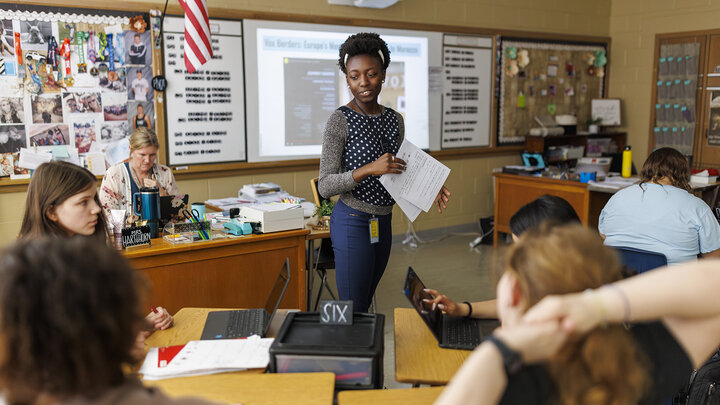The College of Education and Human Sciences at the University of Nebraska-Lincoln is expanding its teacher apprenticeship partnership with Lincoln Public Schools and creating new partnerships to benefit 16 schools in ESUs 5 and 6 thanks to new funding from the Nebraska Department of Education’s (NDE) Grow Your Own Teacher Apprenticeship Program.
CEHS was awarded $700,000 to fund seven different apprenticeship program options in areas with severe educator shortages. Six of the seven CEHS programs will lead to endorsements and licensure in special education through UNL’s Department of Special Education and Communication Disorders, while the seventh will prepare early childhood inclusive educators in Lincoln Public Schools through UNL’s Department of Child, Youth and Family Studies.
“We are excited to expand our apprentice training program to include ESU 5 and 6 as well as continuing to partner with Lincoln Public Schools,” said Sue Kemp, professor of practice in special education. “We look forward to training 24 new highly qualified special education teachers who will be able to support students with disabilities in their districts.”
The special education partnership with LPS is an expansion of the pilot program started this summer as a structured, on-the-job learning model to prepare eight individuals already employed in the schools for successful careers as special education teachers. The new expansion adds the option for candidates with associate’s degrees to receive their bachelor’s degrees, as well as the endorsement and licensure.
“Although it was initially scary to try something so new and innovative like this, I am so glad that I did,” said Abbey Traynowicz, an apprentice at Lincoln Southwest High School. “Being a part of this apprenticeship has challenged me and helped me grow as a person and as a professional. I am so excited to become a special education teacher and have had so much great support while working hard to get there.”
The new funding allows UNL to extend the special education partnership to rural school districts in ESU 5 and ESU 6. Districts within those ESUs will select their employees who qualify to participate in the apprenticeship program. Like LPS, each ESU and its member schools have options for candidates with bachelor’s degrees as well as those with associate’s degrees.
“It is a tremendous opportunity to partner with UNL in the special education teacher apprenticeship program,” said Chris Prososki, superintendent of Southern School District #1, one of nine schools in ESU 5. “As a rural Nebraska district, we look forward to the possibility of growing our own, well-qualified special education teachers to ensure we continue the high-level services our students deserve.”
Additionally, CEHS is adding an early childhood inclusive apprenticeship program option to its partnership with LPS. This option is for undergraduates who have 60-plus credits completed.
CEHS was one of eight educator preparation programs selected for funding by NDE. Teacher apprenticeship programs were established by the Federal Department of Labor in January of 2022 and are designed to provide another option to preparing teachers. It is just one of the options that current exist in the CEHS comprehensive teacher preparation program. In addition to helping address educator shortages in key areas, apprenticeship programs provide apprentices with on-the-job, structured training to achieve licensure in a way that will increase teacher retention within those areas.
The NDE Grow Your Own Teacher Apprenticeship Program and the newly funded partnerships were celebrated during a press conference at Paddock Road Elementary School in Omaha on Nov. 6. NDE Commissioner Brian Maher and Governor Jim Pillen each spoke as part of the celebration, which was also attended by officials from the Department of Labor and the Nebraska Department of Labor. Gov. Pillen also signed a proclamation declaring National Apprenticeship Week beginning Nov. 17.
College of Education and Human Sciences
Child, Youth and Family Studies
Special Education and Communication Disorders




